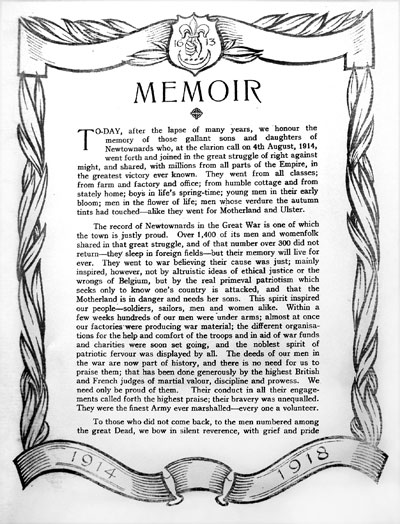MEMOIR
 TO-DAY, after the lapse of many years, we honour the memory of those gallant sons and daughters of Newtownards who, at the clarion call on 4th August, 1914, went forth and joined in the great struggle of right against might, and shared, with millions from all parts of the Empire, in the greatest victory ever known. They went from all classes; from farm and factory and office; from humble cottage and from stately home; boys in life's spring-time; young men in their early bloom; men in the flower of life; men whose verdure the autumn tints had touched -- alike they went for Motherland and Ulster.
TO-DAY, after the lapse of many years, we honour the memory of those gallant sons and daughters of Newtownards who, at the clarion call on 4th August, 1914, went forth and joined in the great struggle of right against might, and shared, with millions from all parts of the Empire, in the greatest victory ever known. They went from all classes; from farm and factory and office; from humble cottage and from stately home; boys in life's spring-time; young men in their early bloom; men in the flower of life; men whose verdure the autumn tints had touched -- alike they went for Motherland and Ulster.
The record of Newtownards in the Great War is one of which the town is justly proud. Over 1,400 of its men and womenfolk shared in that great struggle, and of that number over 300 did not return -- they sleep in foreign fields -- but their memory will live for ever. They went to war believing their cause was just; mainly inspired, however, not by altruistic ideas of ethical justice or the wrongs of Belgium, but by the real primeval patriotism which seeks only to know one's country is attacked, and that the Motherland is in danger and needs her sons. This spirit inspired our people -- soldiers, sailors, men and women alike. Within a few weeks hundreds of our men were under arms; almost at once our factories were producing war material; the different organisations for the help and comfort of the troops and in aid of war funds and charities were soon set going, and the noblest spirit of patriotic fervour was displayed by all. The deeds of our men in the war are now part of history, and there is no need for us to praise them; that has been done generously by the highest British and French judges of martial valour, discipline and prowess. We need only be proud of them. Their conduct in all their engagements called forth the highest praise; their bravery was unequalled. They were the finest Army ever marshalled -- every one a volunteer.
To those who did not come back, to the men numbered among the great Dead, we bow in silent reverence, with grief and pride commingled, with God's ancient sacrifice, a humble and a contrite heart. They added lustre to their country's honour and brought glory to their native place; they bought for us the right to live in quiet homes in the shade of peace and freedom, untrammelled by a conqueror.
"Mourn not for them as gathered to the past;
Their past has power upon the coming years,
And they, themselves, O mourners, will outlast
Their dust, this granite, and all human tears."
Such men are not dead; they live an ampler life elsewhere. To them we shall not say Farewell, but humbly cherish the hope that we may
"Say not Good-night, but in some happier clime
Bid them Good-morning."
For those who lost them the measure of our pity and sympathy is full; we know the splendid boys and men they lost; the hopeless void their passing caused when time seemed to stand still, and all thoughts and feelings melted in a wild swirl of numbing wretchedness and sense of desolation. Their sense of grief and loss can only be soothed by the healing touch of Time's gentle fingers, by the knowledge that their loved ones died, as brave men would always die, in the service of God and their country; that now the Peace that knows no breaking has enfolded them in soft and jealous wings, that their great souls have found a fitting home and their memory an everlasting fragrance.
And so the people of the Ards may thank God in all humility that they did their duty nobly; that when the trial came they rose to a great occasion worthily, that the old ancestral warlike spirit of North Down woke again within them and proved that the war wings on the helmets of their forefathers were truly typical of the eagle spirit of their descendants a thousand years later.
"They shall not grow old, as we that are left grow old,
Age shall not weary them, nor the years condemn,
At the going down of the sun and in the morning
We will remember them."

